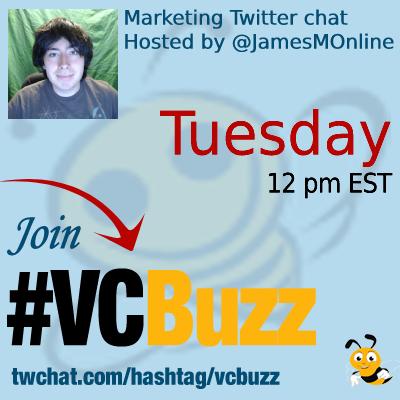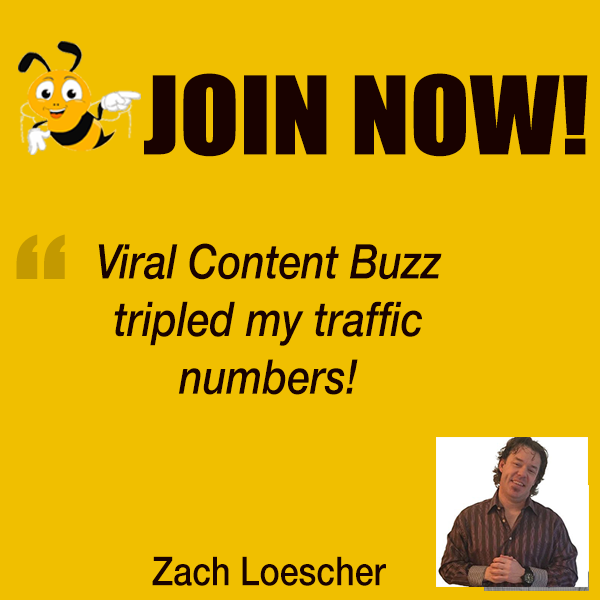
Lots of people go online to make an extra income. They start blogs, launch Youtube channels and work hard on their Instagram content.
Yet, getting clicks and followers is one problem but monetizing those is an absolutely task that doesn’t just happen. It needs a lot more work, research and experimentation.
So what works?
***Add #VCBuzz chats to your calendar here.
***Please sign in here to follow the chat -> twchat.com/hashtag/vcbuzz
About @JamesMOnline
James McAllister is a blogger, marketer, and entrepreneur. Sharing tips that have helped me sell hundreds of thousands of products in a variety of industries.
Make sure to enroll in some of James’s awesome marketing courses!
Questions we discussed
[Shortly after the chat we’ll update this article with @JamesMOnline’s answers. Our awesome Buzzers are welcome to chime in with their own questions and answers!]Q1 How did you become a digital marketer? Please share your career story!
In 2011, I stumbled upon a video about Google Adsense from a lady named Lisa Irby. The idea was that you could create a website, write articles, and put ads on the content. Then, you got paid when someone clicked the ads. I earned my first dollar, and I was hooked!
Although it took a few blogs to find my footing, I found my first success running a website about iPhones and iPads, which gave me my first taste of what it was like to make a full-time living online.
Since then I’ve launched about a dozen other blogs, many of them failures, some quite successful. I’ve also dabbled in things like freelancing and Amazon FBA, but returned to content businesses due to the freedom they provide. Nothing beats them in my opinion!
For a bit of context, my eCommerce company was shipping over 1,000 units a day out to customers at many points. The money was good, but I was miserable. Never again, haha!
For blogging specifically, I focus first on what I’m interested in learning more about (not necessarily what I’m already an expert in.) Then, I try to find at least 200 article topics before I start any new projects. If I can’t, then I don’t pursue it!
If you’re building content with a YouTube channel or a podcast, I think you can definitely afford to be less strict in terms of how many topics you need to have in mind to get going.
Q2 What was your most successful monetization tactic?
By far, selling digital info products. Ultimately, if you want to make a lot of money from a small audience, you need to ensure you have the opportunity to earn a larger amount per person. Especially with attention getting harder to come by.
An example – at an RPM of $3 (which is about average on YouTube for many niches), one $200 sale earns the same as over 66,000 views. Most niches allow for a course to be sold for at least $200.
If you shift your focus from trying to be an influencer and get as many views as possible, to trying to generate leads and promote actual products, you can make a lot more money with a much smaller audience.
I still monetize all websites with ads / affiliate links, but it’s usually easier to focus on making more per person, than trying to scale with ads / affiliate offers alone.
I rarely market products directly on public platforms, to be honest. (Though I do sometimes.) Most of the time, it’s sending people to an email list, then promoting products there.
The reason being, it’s hard to build trust on just one piece of content, even it’s good. So, it’s better to do what you can to preserve the relationship so you can get in front of them over and over again, then start introducing products later.
For years, my entire strategy has been pushing people from my blogs, to email lists. Nothing more than that, really.
It’s definitely harder! The more expensive the product, the longer it takes. I’ve been able to sell low ticket offers ($7-50) straight from the content, but almost all larger purchases come from email.
From blogging, I’d say that it has. People don’t read blogs as religiously as they used to, at least not in most niches. With my coaching clients, I’ve seen a shift of them in the last few years with more of them getting a higher percentage of their leads from YouTube. I do think people trust you more when they can see you on video. Though I can’t speak of my own results yet, I literally just relaunched my YouTube channel a few days ago haha. Looking forward to seeing how it works!
I haven’t personally experienced that much of a decline in open rates or deliverability. A strong welcome sequence helps a lot! But it’s definitely harder in some niches than others. Creator businesses / personal brands have it easier in my opinion. It’s obviously not realistic for everyone, but if your emails are really good, people will go out of their way to look for them, even if they end up in spam. I love following and studying the emails of exceptional email marketers to see what tips I can apply myself!
Q3 Is passive income a myth? Or can you actually create income that just keeps building up without your active involvement at some point?
Yes and no. In my opinion it isn’t about making it 100% passive. Instead, it’s about two things – maximizing your earnings per hour worked, and reducing any ongoing time obligations.
If you want 100% passive income, take time to make a ton of money and invest it it index funds. But, I really don’t believe it’s necessary.
If I can work an hour or two a day on average, and schedule stuff out months in advance without me even needing to look at the computer, then it’s passive enough for me.
I believe the Pareto principle applies to content businesses – 20% of the actions lead to 80% of results. With the rights systems in place, 1-2 hours worth of work each day is more than enough. Or, work one day a week for a full day, and take the rest off.
If anyone is interested, I share the exact content strategy + monetization system I use to run passive content businesses in this free workshop. You’re also welcome to DM or email me with questions, or ask them here!
Long story short, if you have a passive way to get traffic, and a passive way to monetize, it can be 99% passive. Then, all you have to do is just focus on increasing the number of people you reach each day.
Very well said! This is one reason I’m hoping to put a little less reliance on blogging myself this year, with all the new AI tools coming out. I have a lot to say about that, but that would best be a topic for another day hahaha
Yes! Taking too much focus off your projects leaves you vulnerable, so instead I really like focusing on my return per hour invested, rather than focusing on making it completely passive.
Q4 How to monetize your social media activity without ruining your personal brand?
It’s all about intention. I don’t think promotion or monetization is bad at all. If your products or offers are genuinely helpful, then you’re doing your audience a favor by making them aware. People are more then happy to pay for products that actually help them.
That being said, we’ve got to be realistic. If every post is a promotion, you can’t expect to have great engagement. So, you’ve got to find the balance that works for you.
Focus on giving value first. Respond to comments. Involve yourself in the community. Put the ‘social’ in social network. When it’s obvious you actually care about more than just yourself, people usually don’t have a problem with you occasionally pitching something.
At the same time, don’t forget you’re in business to make money either. It’s easy to get caught up focusing too much on social, celebrating vanity metrics, but as they say, ‘likes don’t pay your bills.’
Q5 What are your favorite digital marketing tools?
ActiveCampaign is by far my favorite, as it plays the biggest role in my business. It’s email marketing software, and its automation features can be as basic or as complex as you want them to be. It’s really helped me make this whole thing almost passive!
I also rely heavily on Ahrefs for coming up with content ideas I can rank for, and general SEO. Especially for my websites, Ahrefs is indispensable.
A few others I enjoy are Sprout Social (social media scheduling / management), Adobe‘s product line (Photoshop, Illustrator, Premiere, Acrobat, Lightroom), Thrive Leads (email forms), Chatra (live chat), and Learndash (for self-hosting courses).
Our previous monetization chats:
- How to Monetize Your Blog with @BloggingHerWay
- How to Promote and Monetize Your Videos with Ileane Smith @Ileane
- How to Monetize Your Personal Brand: #WinnieSun @SunGroupWP
- Social Media ROI: Art or Science? with David Pepper @thedavepepper #VCBuzz
- Visual Content Marketing Tips with Nicolina Wroblewski @TheMissNicolina #VCBuzz
- What Works in Engagement Marketing with @PR_Kristyna #VCBuzz



